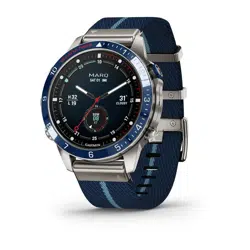Loading ...
Loading ...
Loading ...

Body Battery
Your watch analyzes your heart rate variability, stress level, sleep quality, and activity data to determine your
overall Body Battery level. Like a gas gauge on a car, it indicates your amount of available reserve energy. The
Body Battery level range is from 0 to 100, where 0 to 25 is low reserve energy, 26 to 50 is medium reserve
energy, 51 to 75 is high reserve energy, and 76 to 100 is very high reserve energy.
You can sync your watch with your Garmin Connect account to view your most up-to-date Body Battery level,
long-term trends, and additional details (Tips for Improved Body Battery Data, page56).
Tips for Improved Body Battery Data
• For more accurate results, wear the watch while sleeping.
• Good sleep charges your Body Battery.
• Strenuous activity and high stress can cause your Body Battery to drain more quickly.
• Food intake, as well as stimulants like caffeine, has no impact on your Body Battery.
Performance Measurements
These performance measurements are estimates that can help you track and understand your training activities
and race performances. The measurements require a few activities using wrist-based heart rate or a compatible
chest heart rate monitor. Cycling performance measurements require a heart rate monitor and a power meter.
These estimates are provided and supported by Firstbeat Analytics
™
. For more information, go to garmin.com
/performance-data/running.
NOTE: The estimates may seem inaccurate at first. The watch requires you to complete a few activities to learn
about your performance.
VO2 max.: VO2 max. is the maximum volume of oxygen (in milliliters) you can consume per minute per kilogram
of body weight at your maximum performance (About VO2 Max. Estimates, page57).
Predicted race times: The watch uses the VO2 max. estimate and your training history to provide a target race
time based on your current state of fitness (Viewing Your Predicted Race Times, page58).
HRV status: The watch analyzes your wrist heart rate readings while you are sleeping to determine your heart
rate variability (HRV) status based on your personal, long-term HRV averages (Heart Rate Variability Status,
page59).
Performance condition: Your performance condition is a real-time assessment after 6 to 20 minutes of activity.
It can be added as a data field so you can view your performance condition during the rest of your activity. It
compares your real-time condition to your average fitness level (Performance Condition, page60).
Functional threshold power (FTP): The watch uses your user profile information from the initial setup to
estimate your FTP. For a more accurate rating, you can conduct a guided test (Getting Your FTP Estimate,
page61).
Lactate threshold: Lactate threshold requires a chest heart rate monitor. Lactate threshold is the point where
your muscles start to rapidly fatigue. Your watch measures your lactate threshold level using heart rate data
and pace (Lactate Threshold, page62).
Stamina: The watch uses your VO2 max. estimate and heart rate data to provide real-time stamina estimates.
It can be added as a data screen so you can view your potential and current stamina during your activity
(Viewing Your Real-Time Stamina, page63).
Power curve (cycling): The power curve displays your sustained power output over time. You can view your
power curve for the previous month, three months, or twelve months (Viewing Your Power Curve, page63).
56 Appearance
Loading ...
Loading ...
Loading ...
